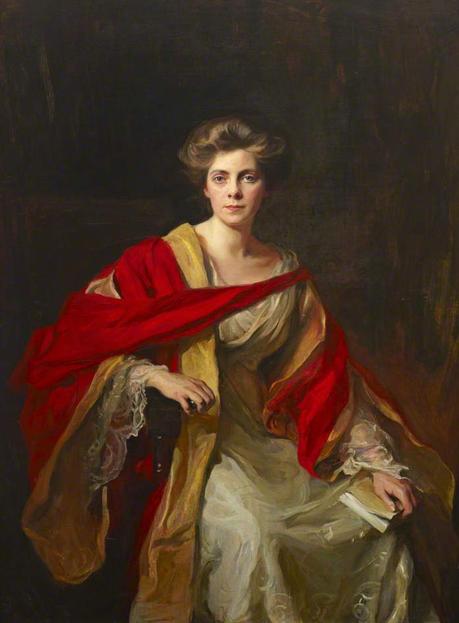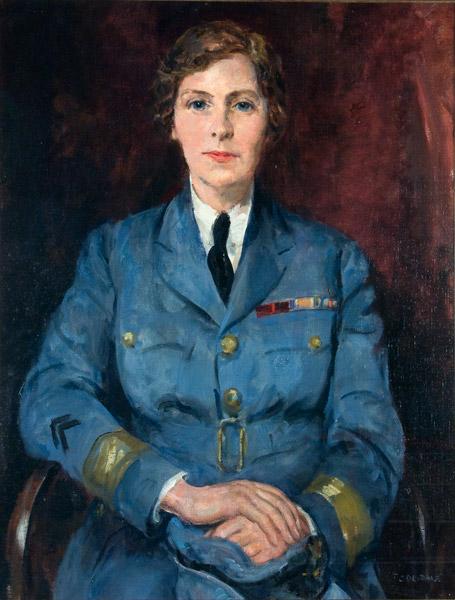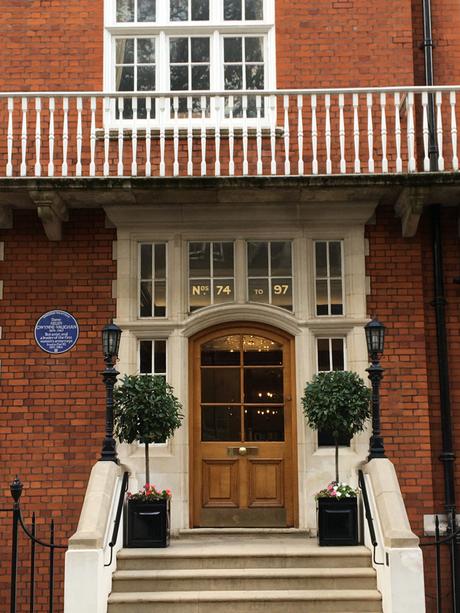 Dame Helen Gwynne Vaughan by Philip de Laszlo
Dame Helen Gwynne Vaughan by Philip de LaszloThe second in my series of women honoured with Blue Plaques in London by English Heritage is Helen Gwynne-Vaughan (1879-1967). She was a celebrated botanist and the leader of the Women’s Army Auxiliary Force and later Women’s Royal Air Force during WWI, being made a Dame in 1919 for her extraordinary contribution to the war effort. While it must be acknowledged that Gwynne-Vaughan was born into an aristocratic, wealthy household, and was able to pursue much of her interests due to a good education, financial security and excellent connections, it cannot be denied that she made the most of her opportunities and carried them out with an exceptional level of skill and talent.
Born in London in 1879, Helen had a peripatetic childhood due to her stepfather’s diplomatic career. Educated by governesses and then later at Cheltenham Ladies’ College, she became one of the first female students to study for a degree at King’s College London, where she gained a BSc in Botany and Zoology. She followed this up with a DSc in 1907, while working at the women’s college of the University of London, Royal Holloway, as a research assistant, specialising in fungal reproduction. While she was at Royal Holloway, she became very active in the suffrage movement, co-founding the University of London Suffrage Society with Louisa Garrett Anderson, sister of Millicent Garrett Fawcett, leader of the National Union of Women’s Suffrage Societies. In 1909, aged 30, she became Head of the Botany department at Birkbeck College in London, where she met her future husband, David Gwynne Vaughan, a fellow academic who died of tuberculosis in 1915, after only a very brief four year marriage.

In 1919, it was decided that due to heavy casualties in France, a women’s batallion needed to be sent out to do some of the ‘back of house’ jobs such as cooking, typing and driving, so that men would be freed up for the front lines. Helen’s family connections to the military, as well as with prominent women suffragists, meant that she was chosen as an ideal candidate to become the leader of this women’s force in France, which would eventually number 10,000 and be named the Women’s Army Auxiliary Corps, or WAAC. Her leadership skills – honed during her teenage years working in girls’ clubs, bringing working class women into line – proved to be exceptional, and despite some initial scepticism from male military leaders (naturally!), she became so respected for her organisational might that she became the first woman to be awarded a military CBE, and was promoted to head of the Women’s Royal Air Force in 1918. Her further success at this earned her a DBE, making her Dame Helen Gwynne-Vaughan.

After the war, Helen returned to academic life, becoming the first female Professor at Birkbeck College in 1921. She published widely in her field of mycology, and made Birkbeck a highly respected and popular center for the study of botany. She also took a keen interest in politics, standing three times as a Conservative candidate in general elections (though she was never elected), and her reputation in military circles continued to be so great that she was asked to lead the ATS – the women’s branch of the army – on the outbreak of WWII, which she did until 1941, when she was delighted to see the success of her campaign to have the women’s branches of the army given full military status, meaning that the women were no longer ‘just’ volunteers and would be paid for their work.
This remarkably talented woman, who was an organisational powerhouse as well as a gifted academic, made huge strides forward for women in two very different fields that were largely dominated by men. She didn’t find this easy; brought up as an aristocrat, and to flirt and please men, her use of these skills to charm male academics alienated her from her female peers. She was also considered to be ‘aggressive’ and too determined to further her own career, and faced resentment from members of her department as a result. Some of her students found her too demanding, and her colleagues, a micro-manager. In the army, she faced a huge amount of sexism, and yet her attempts to create rules and regulations to prevent this led to her being labelled as too rigid and controlling. Trying to get ahead in a man’s world was a tightrope for Gwynne-Vaughan. Getting ahead often meant being criticised and disliked – both for behaving too much like a woman, and then for behaving too much like a man. She often complained that she had been prevented from progressing as far in her career as she would have liked due to her sex, and I don’t doubt it – though it seems to me that she managed to succeed exceptionally well regardless.
Helen Gwynne-Vaughan lived for most of her adult life in Flat 93, Bedford Court Mansions, where her plaque was erected earlier this year. This portered redbrick Victorian block of flats is a very smart address, and would always have been exclusive, reflecting Gwynne-Vaughan’s aristocratic roots. It’s just off the hustle and bustle of Tottenham Court Road, behind the lovely Georgian Bedford Square, and a stone’s throw from the British Museum. It must have been a lovely place to live; a very suitable address for such a redoubtable woman.
